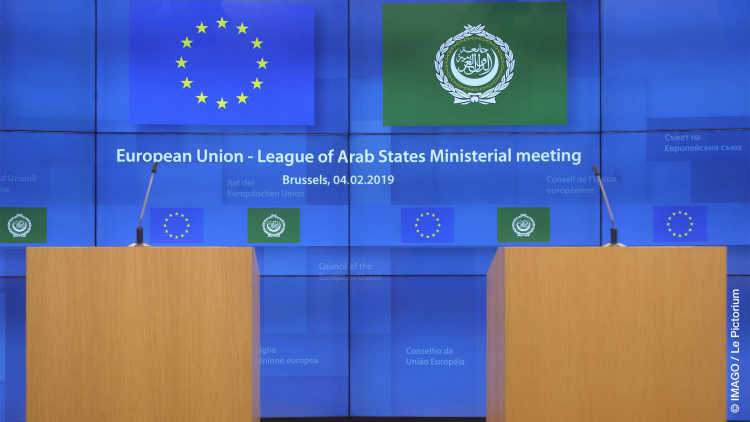- Home
- Publications
- GIGA Focus
- Philippine President Embraces Global Alliances to Push Digitalisation
GIGA Focus Asia
Philippine President Embraces Global Alliances to Push Digitalisation
Number 7 | 2024 | ISSN: 1862-359X

Since taking office in 2022, President Ferdinand Marcos Jr. has shifted from his predecessor’s pro-China stance towards a focus on balanced global partnerships to boost digitalisation. By collaborating with key global partners, he aims to enhance the Philippines’ internet infrastructure, e-governance, and cybersecurity, and thereby establish the country as a regional leader in digital connectivity.
Marcos Jr. has engaged tech-savvy Filipinos by embracing the country’s vibrant internet culture and rapid adoption of artificial intelligence. His administration has launched several ambitious infrastructure projects with global partners to improve connectivity.
In 2022 the Philippines introduced Starlink through foreign ownership reforms, followed by the 2023 expansion of Copernicus services with European Union funding. A World Bank project is also enhancing remote connectivity, reflecting continuous efforts to improve digital infrastructure.
In 2024 Germany and the Philippines are marking 70 years of diplomatic relations by strengthening their collaboration in areas such as training and cyber defence. For the first time in over a decade, the Philippines hosted Germany’s foreign minister, laying the groundwork for a strategic partnership.
Marcos Jr. is also pursuing deeper ties with Japan, the United States, and international organisations to accelerate the Philippines’ digital transformation. Amid the country’s concerns regarding its reliance on Chinese technology, Germany presents itself as a valuable partner, offering its engineering expertise and shared democratic values.
Policy Implications
Global partnerships are driving digitalisation in the Philippines, whose potential to become a regional digital leader makes collaboration vital for German and other European actors. While advanced technology facilitates immediate progress, long-term success depends on continuous training and international knowledge exchange, reducing reliance on foreign technology and fostering local innovation.
The Philippines’ Shift from Pro-China to Global Partnerships in Digitalisation
The digital sector is a key economic driver in the Philippines, supported by robust government initiatives and international partnerships – in the past, largely with China. However, concerns over data security, privacy, and economic dependency on Chinese technology – particularly through initiatives such as the Belt and Road Initiative (BRI) and Digital Silk Road (DSR) – underline the need for diversified international collaboration and a strong legal framework to protect national interests. As the Philippines navigates this landscape, strategic planning and cooperation with other nations are crucial to mitigating cybersecurity risks and ensuring equitable economic growth.
Since taking office in 2022, President Ferdinand Marcos Jr. has shifted away from former president Rodrigo Duterte’s pro-China stance, focusing instead on balanced global partnerships to advance digitalisation. His administration prioritises the digitalisation of essential government services, mirroring global trends that are reshaping business and trade amid complex digital challenges, such as the implementation of an integrated “eGovernment Philippines” (eGovPH) app for centralised access to services and the establishment of a National Identification System to enhance citizen access and security. Issues such as cross-border data management, intellectual property rights, and consumer protection extend beyond national borders, further complicating the digital governance of the Philippines. By collaborating with key international partners, Marcos Jr. aims to strengthen the Philippines’ internet infrastructure, e-governance systems, and cybersecurity, thereby positioning the country as a regional leader in digital connectivity.
Political Shifts Under President Marcos Jr.
Marcos Jr., who succeeded Duterte in 2022, has shifted the political landscape significantly. Duterte’s administration had pivoted towards China and Russia while maintaining a critical stance towards the United States and the European Union. This included withdrawing from the International Criminal Court amid its investigation into Duterte’s controversial “war on drugs” years. Marcos Jr.’s foreign policy aims to balance relations with the United States while recalibrating economic ties with China, a strategy complicated by escalating tensions in the South China Sea and China’s growing assertiveness. Domestically, Marcos Jr. has prioritised modernisation and digitalisation, particularly in government services and economic growth, as noted in his 2024 State of the Nation Address (Flores 2024). However, concerns remain about his administration’s handling of corruption, democratic integrity, and human rights issues, with questions lingering over media freedom and the unresolved recovery of wealth accumulated by the Marcos family during Ferdinand Marcos Sr.’s authoritarian rule (1965–1986). Marcos Jr.’s accession to power signifies a notable political shift: the culmination of a decades-long effort to rehabilitate the Marcos family name by reshaping the narrative of Marcos Sr.’s regime. Dissatisfaction with post-1986 administrations, particularly their handling of poverty and inequality, has further bolstered his appeal, especially among younger voters (de Guzman 2022).
Marcos Jr. built alliances with regional dynasties and established a key partnership with the Duterte family. However, tensions have surfaced, particularly over constitutional reforms and foreign policy shifts. Disagreements over China, particularly concerning the South China Sea, emerged as a point of contention, with Duterte urging Marcos Jr. to maintain a strong relationship with China. The end of the Marcos–Duterte political partnership became evident with Sara Duterte’s resignation from her cabinet positions, marking a shift that could influence future political dynamics, including the 2028 elections.
Additionally, Marcos Jr.’s recent ban on Philippine Offshore Gaming Operators marks a break from Duterte’s era, where the industry thrived but was tied to organised crime. The move aims to improve relations with China, which opposes offshore gambling targeting its citizens. The ban raises concerns about job losses and a potential rise in illegal gambling, highlighting the challenge of balancing economic stability with crime prevention.
Current Social Media Landscape in the Philippines
According to Statista, it is expected that by 2029 the vast majority of Filipinos will be active social media users. The Philippines is often dubbed the social media capital of the world due to its exceptionally high average daily usage, which is about three hours. Facebook, TikTok, and Instagram are the primary platforms used by Filipino internet users. Filipinos are known for their early adoption of technology and their high level of internet savviness (Balita 2023).
A Telenor Asia study (2023) highlights the Philippines as the most digitally engaged country in South and Southeast Asia. Filipinos spend more time online than in face-to-face interactions, particularly through mobile phones. The COVID-19 pandemic further solidified this trend, making mobile devices essential for socialising and entertainment. Filipinos are heavy users of social media and increasingly participate in online gaming and esports. Educational apps and online learning platforms are also widely used, reflecting a growing reliance on digital solutions for social, educational, and entertainment needs (Telenor Asia 2023).
Microsoft and LinkedIn’s (2024) Work Trend Index recognises the Philippines as a leader in workplace artificial intelligence adoption, with Filipino knowledge workers showing higher usage levels compared to global and regional peers. Artificial intelligence is viewed as crucial for maintaining business competitiveness in the Philippines. However, there is concern about the lack of clear implementation strategies, which could impede progress. Filipino users are notable for their engagement with artificial intelligence, but there is a need for enhanced training and skill development for artificial intelligence power users to fully capitalise on these technologies. The authors encourage Filipino and international companies to invest in artificial intelligence tools and workforce training to remain competitive (Microsoft and LinkedIn 2024).
Improving Connectivity with Global Infrastructure Partnerships
Given the archipelagic nature of the Philippines, comprehensive digital transformation is required to extend connectivity beyond major urban centres to all regions. This involves not only enhancing infrastructure but also fostering a supportive regulatory and innovation environment, promoting digital literacy, and building internal capacity to fully leverage technology. However, deploying digital infrastructure technologies such as fixed lines, wireless, satellite internet, and undersea cables remains challenging, especially due to inadequate government funding. Poor connectivity in rural areas exacerbates the digital divide, particularly amid rapid technological advancements in the other regions. Outdated regulations fail to address the demands of the Fourth Industrial Revolution, leaving the Philippines among the most expensive providers of information and communications technology (ICT) services in the Association of Southeast Asian Nations (Amador III and Baladjay 2024).
The Philippines, as a developing economy, is gradually integrating digital trade provisions through its involvement in major trade agreements such as the Regional Comprehensive Economic Partnership. While the focus of these agreements has traditionally been on market access for goods, services, and investments, e-commerce and digital trade provisions are becoming more prominent. However, unlike more advanced economies such as Singapore or Japan, the Philippines is still in the early stages of adopting comprehensive digital trade frameworks. The inclusion of digital trade elements in these agreements presents an opportunity for the country to enhance its digital infrastructure and strengthen its participation in the global digital economy (Bayudan-Dacuycuy and Serafica 2023).
The Philippines has long faced criticism for its internet infrastructure, which has struggled due to a mix of policy and regulatory challenges. Outdated licensing systems, non-transparent spectrum management, and barriers to market entry have hindered the development of reliable connectivity and efficient resource use. Despite recent improvements, significant regulation challenges remain (World Bank 2024).
Strategic Initiatives and International Collaborations
To address these issues, in May 2022 the Philippines became the first country in Southeast Asia to launch SpaceX’s Starlink broadband services. This move was enabled by changes in foreign ownership regulations, allowing for a greater share of foreign investment in essential services (World Bank 2024). Further progress was made in April 2023 with the Digital Transformation and Connectivity Initiative, part of the Sustainable Connectivity Regional Team Europe Initiative, which integrates the Copernicus Earth observation programme into the Southeast Asian region. This initiative, supported by substantial European Union funding, aims to scale up service provision from the Copernicus mirror site also to other Southeast Asian nations, providing them with high-speed internet capacity. Copernicus Philippines (CopPhil) is the first Earth observation programme in Southeast Asia and is intended to assist with disaster readiness and risk management, as well as boosting resilience in the wake of such hazards (European Union 2024). The programme also improves data access and processing and supports efforts to combat climate change, positioning the Philippines as a key player in regional digital and climate initiatives.
Building on these efforts, the European Union’s Digital Economy Package (2024–2028) seeks to strengthen digital infrastructure in the Philippines through investments in connectivity solutions, including fifth-generation (5G) technology and cybersecurity. It also explores synergies with other regional projects and includes a study on Indo-Pacific connectivity. The package supports the Philippines’ role as a regional digital hub, enhancing its capacity for disaster preparedness, climate mitigation, and addressing the broader digital divide (European Union 2024).
In efforts to enhance the national optical-fibre backbone and improve connectivity in underserved regions, particularly in the southernmost part of the Philippines – Mindanao, where internet penetration remains relatively low – Marcos Jr. launched the national government’s free Wi-Fi BroadBand ng Masa project. Supported by a World Bank loan, the initiative facilitates the acquisition of submarine cables connecting the Visayas to Mindanao (Flores 2024). Additionally, the Asian Development Bank and the multi-country iSON Tower Limited Incorporated have signed a major loan agreement to construct a significant number of shared telecommunications towers in the Philippines, improving digital connectivity for underserved communities. This complements earlier funding for additional towers in Mindanao and the Visayas.
The Better Access and Connectivity project by the United States Agency for International Development (USAID) aims to enhance digital infrastructure and cybersecurity in the Philippines, prioritising affordability, innovation, and inclusivity. A significant focus is on adopting Open Radio Access Networks technology, which reduces costs, improves security, and strengthens supply chain resilience. The Philippines seeks additional investment to advance its digital infrastructure and literacy, collaborating with Japan on 5G networks through this technology. Japan is also investing in the Philippines’ ICT sector to improve internet connectivity and expand domestic broadband, notably partnering with IPS Incorporated to accelerate high-speed internet deployment. Supported by the United States, this initiative aims to counter China’s telecommunications influence and reinforce the Philippines’ strategic role in the Indo-Pacific region.
Strengthening Training and Cyber Defence with Germany
In 2024 the Philippines are welcoming high-ranking officials from Germany as the two countries celebrate 70 years of diplomatic relations. The anniversary also provides an opportunity to explore ways to address future challenges together. In January, Marcos Jr. hosted German foreign minister Annalena Baerbock, marking the first such visit in over a decade and leading to strengthened bilateral cooperation between the countries in the areas of trade, climate change, and maritime security.
In March, Marcos Jr. visited Germany, the reciprocal visits emphasising the two countries’ shared commitment to advancing technical and vocational training, particularly in digitalisation and the green economy. The cooperation programme between the Philippines’ Technical Education and Skills Development Authority and Germany’s Federal Institute for Vocational Education and Training has also been renewed. During the visit, President Marcos met with the president of Siemens, among others, to ensure the latter’s support for the Philippines’ digital transformation efforts and commitment to training Filipino workers and businesses in new technologies. Having operated in the Philippines for over a century, Siemens has made significant contributions to sectors such as telecommunications, energy, factory automation, mobility, and smart buildings.
The partnership between the Philippines’ Department of Trade and Industry and industry leaders such as Siemens and Bosch marks a significant move towards advancing the Philippines’ Industry 4.0 initiatives. By establishing a pilot factory in the Philippines featuring robotics and augmented reality, Siemens aims to modernise local manufacturing through digital and automation technologies. German companies’ involvement underscores a strong commitment to driving innovation in the region, significantly enhancing the Philippines’ industrial capabilities, stimulating robust economic growth, and firmly positioning the country as a leading technology hub in Southeast Asia.
In August, Boris Pistorius made a historic visit to the Philippines, becoming the first German defence minister to do so. This visit underscores the increasing importance of the Indo-Pacific region in global politics, particularly in light of escalating tensions. The Philippines and Germany signed a defence cooperation agreement aimed at expanding their bilateral relations in areas such as training, technology, and cyber defence. Both countries have faced cybersecurity challenges and recognise the importance of protecting digital infrastructure and national security. The Philippines’ National Cybersecurity Plan for 2023 to 2028 underscores the need for international collaboration, and Germany’s expertise in cybersecurity can help strengthen the Philippines’ resilience in this area.
Expanding Global Partnerships for Digital Transformation
International cooperation is crucial for the Philippines’ development, particularly through partnerships with institutions such as the Asian Development Bank and the World Bank. While these collaborations have improved infrastructure, governance, and social services, challenges persist – for example, low energy investment and delayed fund disbursement. The World Bank shows the highest disbursement rate among top partners, while China has the lowest, underscoring the need for careful management of international relationships (Lowy Institute 2024).
Despite these challenges, the Philippines is not fully distancing itself from China. During President Marcos Jr.’s state visit to China in 2023, the Philippines signed a Memorandum of Understanding with China to enhance cooperation in emerging technologies, telecommunications, and digital governance. However, rising geopolitical tensions have raised concerns about partnership reliability. In response, Marcos Jr. is diversifying international relationships with Japan, the United States, and the United Nations to reduce dependence on a single partner and promote sustainable development in technology and infrastructure.
Digital transformation is a key focus of international collaboration. In 2022 the Philippines partnered with Singapore to enhance digital connectivity, cybersecurity, and e-governance, emphasising artificial intelligence, 5G mobile technology, and the Internet of Things. These advancements are expected to strengthen governance and the digital economy. The Philippines also secured a World Bank loan in 2023 to support digital initiatives, aiming to improve public services, expand financial inclusion, and enhance broadband infrastructure.
Globally, the Philippines is addressing digital economy challenges by joining the Organisation for Economic Co-operation and Development and the Group of 20 (G20) frameworks on taxation. These efforts align with its commitment to ensuring fair taxation while promoting sustainable growth. Additionally, a cyber cooperation agreement with Australia was signed in early 2024, focusing on information sharing and skills development. The Asian Development Bank’s (2024) Country Partnership Strategy and the United Nations Development Programme (2024) are also aligned with these goals, promoting inclusive digital growth and bridging gaps in gender-responsive governance.
The United States also plays a crucial role in the Philippines’ digital development. In 2024 USAID launched the Strengthening Private Enterprises for the Digital Economy project to integrate small and medium-sized enterprises into the digital marketplace, improving their competitiveness. The trilateral summit between Japan, the Philippines, and the United States in 2024 also highlighted the importance of digital technologies.
Japan continues to support the Philippines’ digitalisation efforts, exemplified by a self-driving bus service launched in New Clark City in collaboration with Japan’s New Energy and Industrial Technology Development Organization. Japan is also exploring the digitalisation of essential services such as mail delivery and banking with the Philippine Postal Corporation.
Looking ahead, Canada aims to deepen engagement through a December 2024 trade mission focused on green technology and e-commerce. The establishment of an Agri-Food Office in Manila underscores Canada’s commitment to promoting digital solutions in agriculture, further enhancing bilateral cooperation.
In conclusion, international partnerships are essential for the Philippines as it navigates development challenges and seizes opportunities in the digital economy. Through collaboration with global players, the country can strengthen its digital infrastructure, promote sustainable growth, and enhance resilience in an interconnected world.
Leveraging German Innovation to Reduce Dependence on Chinese Technology
The AidData report indicates that China became a major financier of development projects in the Philippines from 2000 to 2022, using state-directed financing and foreign direct investment. This support thrives under friendly administrations but declines during times of tension. Researchers find that China primarily provides high-interest loans rather than grants, funding both large infrastructure projects and smaller social initiatives. However, concerns about oversight and management persist, particularly regarding state-owned enterprises facing misconduct allegations. Additionally, the rapid implementation of projects often obscures a lack of tangible benefits for Filipinos, many of whom experience increased financial insecurity despite significant investment. Overall, while Chinese investment has growth potential, its uneven outcomes present substantial challenges (Custer et al. 2024).
Since the launch of China’s Belt and Road Initiative (BRI) in 2013, the Philippines has engaged extensively with Chinese investments across various sectors, including digital infrastructure and telecommunications. Additionally, projects such as DITO Telecommunity and the Safe Philippines initiative have raised national security concerns due to potential data sharing with the Chinese government. The popularity of Chinese platforms such as TikTok has sparked discussions about disinformation and security risks. Although the shift towards a digital economy offers benefits such as increased efficiency and job creation, trust in China’s engagement has eroded due to unmet promises and geopolitical tensions. The Philippines government faces the challenge of balancing technological advancement with national security and the risks of digital authoritarianism linked to China’s influence (Amador III and Baladjay 2024).
Germany’s proactive approach to the Indo-Pacific, outlined in its 2020 guidelines (Federal Foreign Office 2020), reflects a strategic realignment to engage with the region amidst the rivalry between the United States and China. This shift positions the Philippines as a key partner in addressing climate change, advancing peace initiatives, and enhancing security cooperation. The Philippine government is focused on improving its digital infrastructure, while German engineering companies are eager to leverage their expertise in this area. This collaboration not only strengthens Germany’s influence in the region but also aids the Philippines in reducing its reliance on Chinese technology. Together, the efforts of both governments can yield mutual benefits through enhanced security frameworks, economic cooperation, and shared democratic values.
Germany is also addressing its own digitalisation challenges. Criticised for lagging behind peers, a new 2024 digitalisation report from the European Commission (2024) reveals Germany’s renewed commitment to advancing its digital landscape, particularly in public services and infrastructure. The report highlights significant investments in digital initiatives aimed at improving accessibility and efficiency for citizens and businesses.
Theoretically, with this emphasis on digitalisation the German government is positioning itself as a potential model for the Philippines, which is grappling with the implications of heavy reliance on Chinese investments in its digital sector. While Chinese investments by government-owned companies offer immediate economic benefits, they also raise concerns over data security and sovereignty. Germany’s focus on transparent, democratic approaches to digital transformation can serve as an alternative framework for the Philippines, promoting sustainable development without compromising national security.
As both nations navigate their respective digital landscapes, Germany’s experience in fostering a secure and efficient digital ecosystem can benefit the Philippines’ strategies. Strengthening partnerships in technology, cybersecurity, and digital governance can facilitate the Philippines’ transition towards a more independent and resilient digital economy, reducing dependence on Chinese influence. By aligning their efforts, Germany and the Philippines can enhance bilateral relations and contribute to a more stable and secure Indo-Pacific region.
Outlook
The Philippines has made considerable strides in enacting legislation to promote digitalisation. However, outdated laws still hinder effective governance, especially regarding emerging technologies such as artificial intelligence and cloud computing. The government’s historical focus on regulatory measures has created a disconnect between technological advancements and legal frameworks, delaying the country’s digital transformation. This lag limits businesses and citizens in fully harnessing digital technologies, ultimately constraining economic growth and innovation.
To bridge this gap, regulatory frameworks must balance innovation facilitation with robust oversight. Updating legislation requires collaboration with domestic and international stakeholders to incorporate diverse perspectives and expertise. Such cooperative efforts can yield responsive policies that accommodate the rapidly evolving digital landscape and support the growth of new technologies.
While navigating digitalisation presents challenges, especially in relation to China, the Philippines must implement safeguards for its digital security while encouraging development. Establishing clear legal protections, investing in cybersecurity infrastructure, and fostering digital literacy are crucial steps. President Ferdinand Marcos Jr.’s commitment to digital reforms signals a positive shift; however, sustained political will is essential for meaningful progress. Effective communication of these reforms is also vital for building public trust and encouraging widespread adoption.
Germany, along with other global partners, prioritises digitalisation in the Philippines through development cooperation, by which it offers vital resources and expertise to foster local innovation and reduce dependence on foreign technology. Germany’s leadership in the responsible development of artificial intelligence within the European Union provides valuable insights for the Philippines. By applying Germany’s best practices in artificial intelligence and cybersecurity, both nations together can strengthen the Philippines’ digital infrastructure and regulatory frameworks.
As the Philippines aims to become a regional leader in digitalisation, Germany’s proactive collaboration will solidify its influence in the Indo-Pacific. Such cooperation can stimulate economic growth and job creation, while also ensuring that Filipino workers possess the necessary digital skills to compete in the global job market. Moreover, focusing on robust data management will create a secure digital environment that protects citizens’ privacy and fosters trust in digital services.
In conclusion, the partnership between the Philippines and Germany is poised to yield significant benefits, enhancing the Philippines’ digital landscape while strengthening Germany’s geopolitical position in the Indo-Pacific. By addressing legislative gaps and fostering innovation, both nations can achieve mutual gains that contribute to regional stability and economic resilience.
Footnotes
References
Amador III, Julio S., and Deryk Matthew N. Baladjay (2024), The Impact of China’s Digital Silk Road on the Digital Domain of the Philippines, in: ISEAS Perspective, 43, Singapore: ISEAS – Yusof Ishak Institute, 12 June, accessed 11 October 2024.
Asian Development Bank (2024), Philippines: Country Partnership Strategy (2024–2029), August, accessed 11 October 2024.
Balita, Christy (2023), Number of Social Media Users in the Philippines from 2017 to 2029, Statista, 22 November, accessed 11 October 2024.
Bayudan-Dacuycuy, Connie, and Ramonette B. Serafica (2023), Critical Issues in the Philippine Digital Economy, Quezon City: Philippine Institute for Development Studies, accessed 11 October 2024.
Custer, Samantha, Bryan Burgess, Jonathan A. Solis, Narayani Sritharan, and Divya Mathew (2024), Beijing’s Big Bet on the Philippines: Decoding Two Decades of China’s Financing for Development, Williamsburg, VA: AidData at William & Mary, 4 June, accessed 11 October 2024.
de Guzman, Chad (2022), Why Bongbong Marcos, a Philippine Dictator’s Son, Leads the Race for the Presidency, in: Time, 9 May, accessed 11 October 2024.
European Commission (2024), Digital Decade 2024: Country Reports: Germany, 2 July, accessed 11 October 2024.
European Union (2024), Digital Economy Package Philippines, February, accessed 11 October 2024.
Federal Foreign Office (2020), Policy Guidelines for the Indo-Pacific: Germany – Europe – Asia Shaping the 21st Century Together, August, accessed 11 October 2024.
Flores, Helen M. (2024), President Marcos Pushes for Digitalization in First 2 SONAs, in: The Philippine Star, 22 July, accessed 11 October 2024.
Lowy Institute (2024), Philippines: Challenges, Trends, Partners, Sectors, Climate, Gender, Projects, accessed 11 October 2024.
Microsoft and LinkedIn (2024), 2024 Work Trend Index Annual Report: AI at Work is Here. Now Comes the Hard Part, 8 May, accessed 11 October 2024.
Telenor Asia (2023), Digital Lives Decoded: Play [Report], 30 January, accessed 11 October 2024.
United Nations Development Programme (2024), UNDP Philippines Thematic Focus Briefer on Digitalization, 15 August, accessed 11 October 2024.
World Bank (2024), Better Internet for all Filipinos: Reforms Promoting Competition and Increasing Investment for Broadband Infrastructure – A Policy Note, Washington, DC: World Bank, 22 January, accessed 11 October 2024.
Editor GIGA Focus Asia
Editorial Department GIGA Focus Asia
Regional Institutes
Research Programmes
How to cite this article
Schipper, Tetiana (2024), Philippine President Embraces Global Alliances to Push Digitalisation, GIGA Focus Asia, 7, Hamburg: German Institute for Global and Area Studies (GIGA), https://doi.org/10.57671/gfas-24072
Imprint
The GIGA Focus is an Open Access publication and can be read on the Internet and downloaded free of charge at www.giga-hamburg.de/en/publications/giga-focus. According to the conditions of the Creative-Commons license Attribution-No Derivative Works 3.0, this publication may be freely duplicated, circulated, and made accessible to the public. The particular conditions include the correct indication of the initial publication as GIGA Focus and no changes in or abbreviation of texts.
The German Institute for Global and Area Studies (GIGA) – Leibniz-Institut für Globale und Regionale Studien in Hamburg publishes the Focus series on Africa, Asia, Latin America, the Middle East and global issues. The GIGA Focus is edited and published by the GIGA. The views and opinions expressed are solely those of the authors and do not necessarily reflect those of the institute. Authors alone are responsible for the content of their articles. GIGA and the authors cannot be held liable for any errors and omissions, or for any consequences arising from the use of the information provided.





















